For a Free E-mail subscription to this newsletter, click below:
.
Meredith Sue Willis's Books for Readers # 184
May , 2016

Issue # 184 of
Books for Readers begins with some celebratory news. First, my friend
Pamela Erens got a stellar review for her new novel
Eleven Hours in The New York Times Book Review.
Second, Burt Kimmelman has an article in
Talisman on
William Bronk that is partly about the longstanding strain of anti-intellectualism in the United State.
Third, my friend
Suzanne McConnell's story “Neighbors” won the 2015
New Ohio Review Fiction contest. The story is now
online to read as a text and as an audio podcast from
New Ohio Review’s website. Set in gritty 1970’s downtown Manhattan, it's a story of friendship with a brilliant and beautiful woman who is also schizophrenic.
And, finally, for something a little less celebratory, here's a quotation from
Ed Myers, author of 37 published books . He says, "I can't seem to stop [writing], and I enjoy the craftsmanship of the task, but I'm skeptical about where any of the books will go once they're done. Writing feels somewhat like woodworking or cooking a good meal: I create something pleasant or even good, and a very small number of people enjoy it. But that's the end of it. There seems to be no 'out there' any more."
Which brings me to the guest essayists for Issue #184. Donna Meredith and Darryl Bollinger discuss the effect of Amazon-dot-com on writing. Has the influence of this International Octopus of a commercial giant been positive or negative? And if it's here to stay, what do writers do about it?
AN UPDATED DISCUSSION ABOUT AMAZON.COM
Amazon: A Writer’s Best Friend or the Devil Incarnate?
It’s hard to believe now, but Amazon-dot-com started as a bookstore before expanding into selling almost anything that fits into a shipping box. Now they dominate the print book market with around two-thirds of all sales. And they have moved into printing and publishing with CreateSpace, a print-on-demand operation; Kindle, which claims two-thirds of ebook sales, and Audible and ACX, which produce audiobooks. And even though Amazon reviews are one of the biggest drivers of book sales, the company also bought Shelfari and Goodreads, online sites where readers can share their opinions on books. They control everything about content these days—which is a little scary.
As an active member of writing associations, I’ve encountered varied points of view concerning
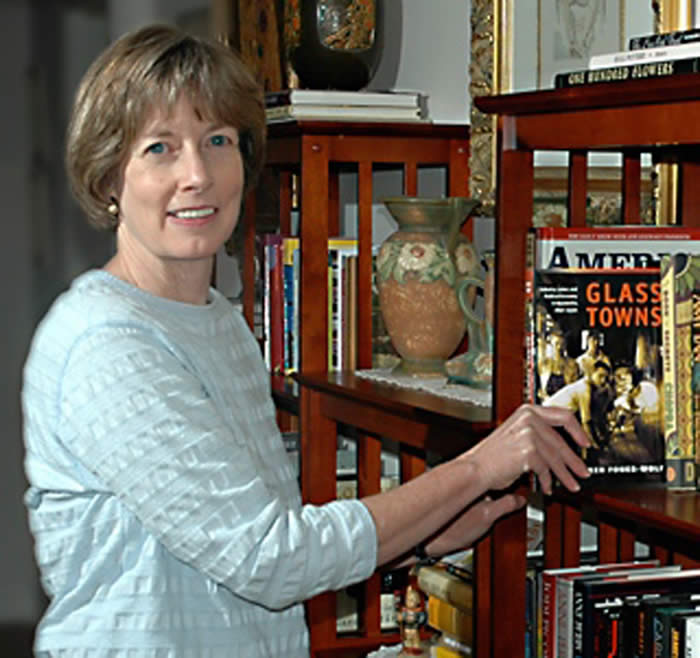
Amazon. For years I coordinated a literary contest, and we often gave judges—accomplished writers themselves—an Amazon gift card. The recipient could use it on a wide array of products, from the obvious choice for writers (books) to the practical (yoga DVDs and hemorrhoid cream to counteract all those hours sitting in front of a computer). The gift cards worked well. Until one judge told us to keep it. She, for one, boycotted Amazon. And she was not alone.
I was aware, of course, that writers had mixed opinions on the marketing behemoth. Stephen Colbert raised quite a ruckus when his latest book was listed as not immediately available because of a dispute between Amazon and his publisher. I thought the problem had nothing to do with me, that it would only affect New York Times Bestsellers. I thought Amazon had better things to do than try to corner more sales from bottom-feeders like me. I was wrong.
Several years ago without warning, my titles showed up as not available for immediate shipment. I realized all those hours spent luring potential readers through promotions and book talks were wasted if they couldn’t click that BUY NOW button and see the book drop into the shopping cart. Online shoppers expect immediate gratification. Not many would return a second time.
My primary book distributor, Ingram Content Group, is one of the largest in the world, but Amazon is nothing if not fiercely competitive. Its nefarious plan was to push writers into using its own printing services. It worked. I uploaded my books to Amazon’s CreateSpace, as well as continuing to use Ingram. Immediately my books showed up as available for purchase again. I’m sure this means when an online shopper buys my book, it is printed and shipped by Amazon, rather than Ingram. I still buy bulk copies from Ingram to sell myself.
While I don’t like Amazon’s aggressive business model, I also have to credit them for making books easily available to customers worldwide. People can and do buy my books all over the country—and once in a while overseas. Barnes and Noble lists my books, too, but I don’t sell nearly as many copies there. Online books ales have pushed many brick and mortar stores out of business. But for writers, the online store has key advantages. If a potential reader sees a review of your book, he can immediately go online and purchase it. To some extent, books are impulse buys. Miss the impulse, you miss the sale. Books are not products a person has to purchase, like groceries or medicines.
The majority of writers and small publishing companies I know use CreateSpace to print their books. As one friend told me, “I've never had any problems with Amazon. The process is easy to understand and execute. I especially like the preview process both on the computer and in print. It lets me see immediately where I've messed up.”
She’s right—the Kindle spell check is stronger than those included in very expensive editing software I’ve purchased. I have to admit Amazon has gone out of its way to make book production simple with almost any software you have on your home computer. They have MS Word templates and a Cover Generator available.
The upside for authors is they can bypass the traditional publishing route, which consumes time and eats up potential profit. The downside is that the market is flooded with titles, some of which are poorly written and edited.
Nonetheless, the bottom line for writers is this: it’s almost impossible not to work with Amazon if you want to sell books.
Amazon: Is it the Best or Worst Thing to Happen to Books and Writers?
As a writer, I am frequently asked this question, especially by other writers. Some tend to view Amazon as the proverbial 600-pound gorilla, constantly shoving lesser players around the playground. Others see Amazon as the great liberator, making publishing available to those who might not have had a chance to publish works via the traditional route. Each side is quick to brandish examples that support their opinion.
I think the answer is neither simple nor binary. Overall, I believe Amazon is good for readers and writers. They have streamlined the publishing process and reduced the entry cost, enabling writers like myself to get books to market easier and faster. Many would also argue that Amazon has been instrumental in putting a bigger piece of the sales price into authors’ pockets.
The number of books published has increased, leading to more competition. I also believe the quality has suffered. Too many times I’ve heard self-published authors proclaim that they don’t need an editor or a cover artist or other professional help. This has conspired to give indie publishers a tarnished reputation. For the free-market advocates, though, the Amazon model allows the market to be the ultimate arbiter, which I see as desirable.
At the same time, giving any one player too much power can be dangerous. According to reliable estimates, E-books represent one-third of all book sales. Amazon has two-thirds of the E-book market. They continue to place tremendous price pressure on traditional publishers, both large and small, not hesitating to use their clout.
They also put pressure on authors. On more than one occasion, I’ve heard complaints about Amazon’s increasingly restrictive attitude on reviews. Again, they have the market presence to dictate the rules.
Last, we are down to basically two nationwide bookstore chains: Barnes & Noble and Books-A-Million. According to Forbes, the number of indie-owned bookstores has declined by over fifty percent in the last twenty years and now represent less than ten percent of all book sales. More books and fewer potential retail outlets mean more pressure on writers.
In conclusion, no author can afford to ignore the Amazon behemoth, like them or not. The industry is changing rapidly, and I like having a gorilla on my side as long as I pay attention to where he steps.
(For a discussion about Amazon several years back, click here.)
RECOMMENDATIONS FROM READERS
Martha Moffett recommends her favorite book about Appalachia: East 40 Degrees: An Interpretive Atlas by Jack Williams. She says, "It's a beautiful book, with old and new maps and great photographs, but most remarkable, it's by a geographer at Auburn University in Alabama who has the most beautiful, unclouded writing style. I have the oversize paperback edition, and have given it as a gift to a couple of people who are notoriously hard to shop for."
Susan Lindsey (of
Savvy-comm) wrote: "Since you've read
Elizabeth Vignee-LeBrun's memoir, you might also want to read
The Fountain at St. James Court, or Portrait of the Artist as an Old Woman by Sena Jeter Naslund. It's a novel within a novel that follows a writer living in contemporary Louisville who is writing about Elizabeth Vignee-LeBrun's life.".
Janet MacKenzie recommends the work of Lucia Berlin. "I have her collection of short stories, A Manual For Cleaning Women, whose title story is very funny. I had not heard of her but she was married to one poet and one jazz musician. She had four sons but died of scoliosis, after defeating cancer and alcoholism. I've also just finished Jane Smiley's Some Luck, which I hope to get my book group to read. Tom Keneally's Daughters of Mars, the novel about two sisters who became nurses in WWI to escape their Australian dairy farm, js a lovely work, filled with fascinating and well-drawn characters."
SHORT REVIEWS (BY MSW UNLESS OTHERWISE NOTED)
Joel Weinberger reviews
The Rise and Fall of the Third Reich: A History of Nazi Germanyby William L. Shirer ( (republished from Good Reads)
(Note: I listened to the unabridged Audible version of this book.)
A very dense and detailed history of the Third Reich that suffers from a few issues, many of which may be attributed to the proximity of the writing to the events that occurred. The author focuses in great depth and detail on several events which, while fascinating, perhaps have little bearing on the actual outcome or politics of the War or of the state.
Most famously, Shirer focuses a very detailed section on the Valkyrie Plot. It is a fascinating attempt at Hitler's life, but ultimately had almost no bearing on history, and I question whether it was the best use of space in this already massive tome. Additionally, there are many notable absences from the book, especially around the war crimes that were committed by the Nazis. While there is a chapter on the death camps and concentration camps, it is rather short given the length of the book, and it misses many important details, such as, for example, the great numbers of non-Jews killed in the camps. This may simply be because it was written so soon after Nazi Germany fell, and a full understanding of their horrors wasn't understood yet, but it certainly makes the reader question other details.
On another note, there are several extreme cases of homophobia expressed by the author that made be very uncomfortable with the book, nearly to the point of putting it down. This includes parts where he states out of hand that certain Nazis were gay and that this explains their horrible actions. Perhaps this is an artifact the era it was written in, but it is jarring none the less.
The Long Shadow of Small Ghosts: Murder and Memory in an American City by Laura Tillman
The Long Shadow of Small Ghosts is a journalist's journey tracking down the details of an appalling crime (the murder of three small children by their parents). The book is about the crime and the city of Brownsville, Texas, and many other matters. Tillman starts with the building where the children were killed, and which is her first assignment dealing with the crime, committed several years before she came to work for the The Brownsville Herald.
She opens up her exploration to the city itself, to the sad stories of the killers, to the general background of curanderismo (there was some talk that witchcraft and possession were involved in the deaths), and to poverty in this border town and across the border in Mexico. She interviews and writes about the lives of people who lived near where the murders occurred, and, gradually, we begin to share her written correspondence with death row inmate John Allen Rubio, the father and stepfather who did the killing, with help from his common law wife. His story occupies a lot of the book, and the climactic sections are her in-person visits with him on death row. The description of what it is like to visit someone on death row is wonderful, as is her ability to capture John Rubio's charm and his profound sadness.
Tillman, manages to do all this by taking us with her on the path that she follows in researching the story without foregrounding her own emotions (although she gives us just enough of her relationships, her family, her feelings about being a Northeasterner living in Texas, etc.). She is our Virgil leading us through the many levels of a hellish crime which came out of great suffering as well as causing great suffering. She takes care to examine her own prejudices and only very rarely gets lost in a little unnecessary philosophizing.
For me, the story and city were fascinating, but the real high point was the gentle probing she does into a man who did monstrous things: our imaginations are stretched by being face-to-face with the human being behind the almost unimaginable deeds.
The Denial of Death by Ernest Becker
This Pulitzer prize winning book published in 1973 was recommended to me by a psychiatrist friend who has read it several times. Becker, a multi-disciplinarian, public intellectual like Susan Sontag, has a deep and abiding faith in philosophy and reason-- and psychoanalysis. Becker is far from uncritical of Freud--he sees him as a genius and great thinker, but hardly right in all or maybe even most particulars. He is also critical of Adler and Jung, likes Otto Rank better. He writes at length in dialogue with Kierkegaard and Paul Tillich.
Becker's book is dense and passionate. It emphasizes disgust with the animality of our bodies, but finds transcendence and even nobility in the attempt of conscious human beings to be heroic in the face of the death we alone of the animals know is coming. Becker himself died shortly after the publication of The Denial of Death. He died, by the way, of colon cancer, which makes me wonder if some of his emphasis on the filth of our bodies grew out of personal experience.
I didn't get everything-- I want to go back and reread some parts I underlined-- so much of it moving and interesting. Becker's style of thinking and the thinkers he engages are still important, but not as central to the life of the mind as they once were. Also, the confident erudition displayed here stands on many assumptions that have been at least partially undermined: that Western culture is supreme; that homosexuality is a perversion, that women are beside the point. These limitations of the thinkers of the nineteenth and twentieth century do not mean we should dismiss them, but they do make us aware that they are one part of the really big picture.
Blood Sisters: The French Revolution in Women's Memory by Marilyn Yalom
This is a book I learned about while reviewing Hilton Obenzinger's book
Why We Write (Issue # 183). Yalom was one of his interviewees, and her study of women's views of the French
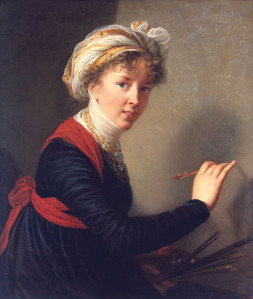
Revolution is build around old memoirs and letters. She has passages from
Elizabeth Vigée-Lebrun's memoir, which I also reviewed last issue (Vigée-Lebrun right). Yalom's book includes a majority of aristocratic writers or admirers of the aristocracy, but also Madame Roland, a Republican who wrote a lot of her husband's material and died on the guillotine during the Terror.
Among the aristocrats, Madame Tour de la Pin has a particularly striking story. She was young and energetic and fled with her husband to various European countries and America during the revolution. They farmed and made a popular hard cider. So she was aristocratic but not afraid of work. There is also a conservative peasant
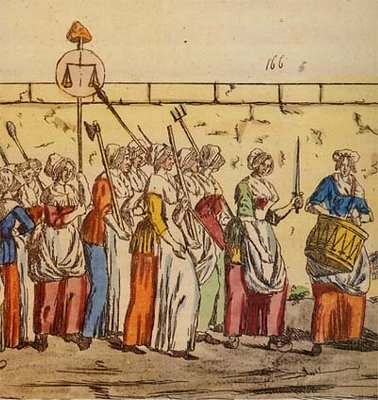
woman who was a soldier of the Vendée. No one fits neatly in a box. My only caveat, and it is one that Yalom is very aware of herself, is that there is very little to represent the truly poor (and most likely illiterate) women who supported the Revolution.
So one has to make do with the endlessly entertaining Liberal and enemy of Napoleon
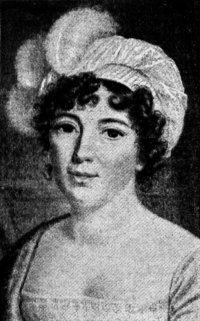
, Madame de Staël (right). Unlike most of the writers here, she was a theorist even more than a recorder of her own experience, although she gets that into her writings too. She was one of the richest women in Europe and always worth reading for her sharp observations and her quasi-feminism-- or at least De Staëlism.
Yalom has great notes and a bibliography, of course, and is also good on the position of women in the eighteenth century, all classes. The work began as a scholarly piece, but is very readable, with excellent images and choice quotations from the various memoirs and letters and journals.
Can You Forgive Her? by Anthony Trollope (first of the Palliser novels)
I just had my Victorian fix for the month. This is the first book of Trollope's six Palliser novels centering on a wealthy, aristocratic British family and on life in and out of Parliament. I've read this before, and like it, even though when it was published, the satirical magazine
Punch referred to it as
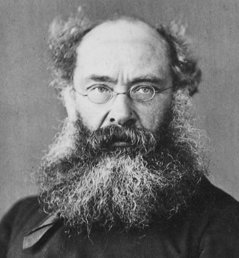
"Can You Stand Her?" and another commentator called it "Can You Possibly Finish It?" Both jokes have some truth. It's long, and the most prominent character, Alice, isn't particularly likable. The best thing here is the difficult marriage of Lady Glencora and Mr. Palliser. Glencora is one of those spirited young women beloved of 19th century male authors like Trollope and Tolstoy. She is an heiress who also wants to have adventures, falls in love with a bounder, and is persuaded by her family and friends to marry the solid if dull Plantagenet Palliser instead. He is delighted with her; she feels trapped.
Both Glencora and Alice Vavasor made me want to give them professions or a university education or a war zone to be brave in. Anything to use their energy and passion and intelligence to worry about something besides love and marriage. Alice's problem is that her true love is so good and loyal that she makes a fetish of insisting that she doesn't deserve him. I found myself wanting her to stand by her guns, but of course in the end he bulldozes her with his devotion, and she accepts him-- or maybe lets him tell her she has..
He also, to give Trollope his due, does what Alice hoped for and runs, or rather, "stands" for Parliament. There is a kind of happy ending, with the marriages in place and Lady Glencora finally producing an heir for her husband, who is himself the heir to a great duke.
So here's the thing with Trollope: he does very well in capturing the yearnings and struggles of young women (and one must remember that all the leading roles here, male and female, are 30 or younger), but he just can't seem to imagine, or doesn't want to imagine, a way for them to become anything but Victorian gentlewomen, wives and mothers. George Eliot's female characters are often thoroughly chastised by experience and the real world, but their aspirations are taken extremely seriously, and they at least attempt to act in the world in ways other than half-heartedly trying to run off with a lover.
So what do I like here? I like how hard Lady Glencora flails against her fate. I like the comic relief of Aunt Greenow and her suitors-- and her choice of a fancy man she carefully arranges NOT to have access to her money. I also like the satisfyingly melodramatic George Vavasor with the eloquent color-changing cicatrix on his face. And Burgo Fitzgerald who is about as useless and hopeless a human being you can find--but wildly handsome.
READ AND LISTEN ONLINE
 Suzanne McConnell's "Neighbors" is now available online from The New Ohio Review and as a podcast as well! Suzanne (picture left) says about the process of posting the podcast: "Wrong audio sent in November, another unavailable for weeks, then that one sent without enough capacity. At last [an angelic friend], an expert sound guy who works in film, brought professional recording equipment, instructed me, and left it. That was January. I had a bad cold. [He] edited out a 7 second coughing fit. More technical difficulties ensued on the other end. But now it’s up! Lessons in persistence, trust, and patience."
Suzanne McConnell's "Neighbors" is now available online from The New Ohio Review and as a podcast as well! Suzanne (picture left) says about the process of posting the podcast: "Wrong audio sent in November, another unavailable for weeks, then that one sent without enough capacity. At last [an angelic friend], an expert sound guy who works in film, brought professional recording equipment, instructed me, and left it. That was January. I had a bad cold. [He] edited out a 7 second coughing fit. More technical difficulties ensued on the other end. But now it’s up! Lessons in persistence, trust, and patience."
PBS interview with Crystal Wilkinson (right) as well as a 2001 clip of her reading a powerful poem called "Dear Johnny P."
An amusing article about the romance novel self-publishing scene-- and the male models who want to be the Fabio of the digital age!
Ingrid Hughes's blog includes a report on a journey through serious mental illness.
John Birch, just retiring from a regular column in this newsletter, has been running a blog for the past few years, and it now contains several dozen of his fiction and nonfiction stories, many of which have been published here and there in the U.S. and Europe. See it at John BIrch Live at Blogspot.
Barbara Crooker's poems are updated often on her website.
ANNOUNCEMENTS, BOOKS RECEIVED, CONTESTS, WORKSHOPS, READINGS AND MORE.
Marc Harshman has a new poetry podcast: Upcoming are Robert Morgan, Jeff Mann, and Maggie Anderson.
Matthew Null's new story collection Allegheny Front is out from Sarabande
A FEW EVENTS WITH ELLEN BASS:
SALON AT GABRIELLA'S CAFE with Tess Taylor and Ellen Bass June 7, 2016 Dinner at 6 PM Reading at 7:30 PM Sponsored by Catamaran Literary Reader Gabriella's Cafe, Santa Cruz, CA For more info, email Catherine Segurson .
PACIFIC UNIVERSITY MASTER OF FINE ARTS IN WRITING Residency dates: June 16-26, 2016 Residency location: Pacific University in Forest Grove, Oregon. If you are interested in learning more about the program, please contact the director, Shelley Washburn or Ellen Bassat with your questions.
POETRY READING & WORKSHOP with Ellen Bass August 19, 2016 Workshop 1:30 to 5:30 Poetry reading 7:30 California Poets in the Schools Annual Conference, Los Gatos, CA. Contact Tina Areja-Pasquinzo.
THE GLINT OF LIGHT ON BROKEN GLASS A Workshop in Writing Stories, Essays and Poems with Pam Houston and Ellen Bass August 21 - 27, 2016 The Inn at Lake Connamarra, Hope, B. C. Canada
IRENE WEINBERGER BOOKS:
.
Darryl Bollinger is the author of five medical thrillers, including
Satan Shoal.
A NOTE ABOUT AMAZON.COM
I have a lot of friends and colleagues who really despise Amazon. See the discussion in Issue # 184, as well as older comments from Jonathan Greene and others here.
The largest unionized bookstore in America has a webstore at Powells Books. Some people prefer shopping online there to shopping at Amazon.com. An alternative way to reach Powell's site and support the union is via http://www.powellsunion.com. Prices are the same but 10% of your purchase will go to support the union benefit fund.
WHERE TO FIND BOOKS MENTIONED IN THIS NEWSLETTER

If a book discussed in this newsletter has no source mentioned, don’t forget that you may be able to borrow it from your public library as either a hard copy or a digital copy. You may also buy or order from your local independent bookstore. (To find a bricks-and-mortar store, click the "shop indie" logo left).
To buy books online, I often use Bookfinder or Alibris. Bookfinder gives the price with shipping and handling, so you can compare what you’re really going to have to pay.
Another source for used and out-of-print books is All Book Stores. Also consider Paperback Book Swap, a postage-only way to trade books with other readers.
Still another place to buy books: Ingrid Hughes suggests "a great place for used books which sometimes turn out to be never-opened hard cover books is Biblio.. I've bought many books from them, often for $4 including shipping."
If you are using an electronic reader like Kindle, Nook, or Kobo, don't forget free books at theGutenberg Project—mostly classics, and free, free, free!
Kobobooks.com sells e-books for independent brick-and-mortar bookstores.
RESPONSES TO THIS NEWSLETTER
Please send responses to this newsletter and suggestions directly to Meredith Sue Willis . Unless you instruct otherwise, your responses may be edited for length and published in this newsletter.
BACK ISSUES click here.
LICENSE


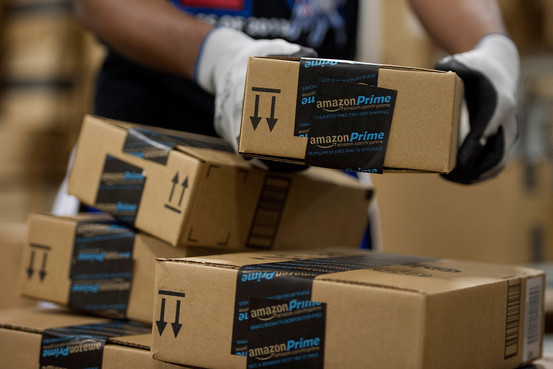

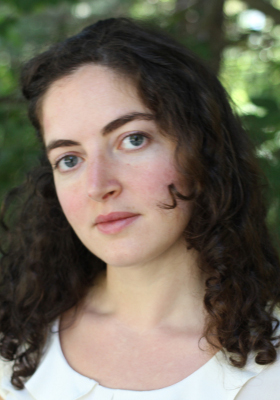
Issue # 184 of Books for Readers begins with some celebratory news. First, my friend Pamela Erens got a stellar review for her new novel Eleven Hours in The New York Times Book Review.
Second, Burt Kimmelman has an article in Talisman on William Bronk that is partly about the longstanding strain of anti-intellectualism in the United State.Third, my friend Suzanne McConnell's story “Neighbors” won the 2015 New Ohio Review Fiction contest. The story is now online to read as a text and as an audio podcast from New Ohio Review’s website. Set in gritty 1970’s downtown Manhattan, it's a story of friendship with a brilliant and beautiful woman who is also schizophrenic.And, finally, for something a little less celebratory, here's a quotation from Ed Myers, author of 37 published books . He says, "I can't seem to stop [writing], and I enjoy the craftsmanship of the task, but I'm skeptical about where any of the books will go once they're done. Writing feels somewhat like woodworking or cooking a good meal: I create something pleasant or even good, and a very small number of people enjoy it. But that's the end of it. There seems to be no 'out there' any more."Which brings me to the guest essayists for Issue #184. Donna Meredith and Darryl Bollinger discuss the effect of Amazon-dot-com on writing. Has the influence of this International Octopus of a commercial giant been positive or negative? And if it's here to stay, what do writers do about it?Amazon. For years I coordinated a literary contest, and we often gave judges—accomplished writers themselves—an Amazon gift card. The recipient could use it on a wide array of products, from the obvious choice for writers (books) to the practical (yoga DVDs and hemorrhoid cream to counteract all those hours sitting in front of a computer). The gift cards worked well. Until one judge told us to keep it. She, for one, boycotted Amazon. And she was not alone.
I was aware, of course, that writers had mixed opinions on the marketing behemoth. Stephen Colbert raised quite a ruckus when his latest book was listed as not immediately available because of a dispute between Amazon and his publisher. I thought the problem had nothing to do with me, that it would only affect New York Times Bestsellers. I thought Amazon had better things to do than try to corner more sales from bottom-feeders like me. I was wrong.Several years ago without warning, my titles showed up as not available for immediate shipment. I realized all those hours spent luring potential readers through promotions and book talks were wasted if they couldn’t click that BUY NOW button and see the book drop into the shopping cart. Online shoppers expect immediate gratification. Not many would return a second time.My primary book distributor, Ingram Content Group, is one of the largest in the world, but Amazon is nothing if not fiercely competitive. Its nefarious plan was to push writers into using its own printing services. It worked. I uploaded my books to Amazon’s CreateSpace, as well as continuing to use Ingram. Immediately my books showed up as available for purchase again. I’m sure this means when an online shopper buys my book, it is printed and shipped by Amazon, rather than Ingram. I still buy bulk copies from Ingram to sell myself.While I don’t like Amazon’s aggressive business model, I also have to credit them for making books easily available to customers worldwide. People can and do buy my books all over the country—and once in a while overseas. Barnes and Noble lists my books, too, but I don’t sell nearly as many copies there. Online books ales have pushed many brick and mortar stores out of business. But for writers, the online store has key advantages. If a potential reader sees a review of your book, he can immediately go online and purchase it. To some extent, books are impulse buys. Miss the impulse, you miss the sale. Books are not products a person has to purchase, like groceries or medicines.The majority of writers and small publishing companies I know use CreateSpace to print their books. As one friend told me, “I've never had any problems with Amazon. The process is easy to understand and execute. I especially like the preview process both on the computer and in print. It lets me see immediately where I've messed up.”She’s right—the Kindle spell check is stronger than those included in very expensive editing software I’ve purchased. I have to admit Amazon has gone out of its way to make book production simple with almost any software you have on your home computer. They have MS Word templates and a Cover Generator available.The upside for authors is they can bypass the traditional publishing route, which consumes time and eats up potential profit. The downside is that the market is flooded with titles, some of which are poorly written and edited.Nonetheless, the bottom line for writers is this: it’s almost impossible not to work with Amazon if you want to sell books.Revolution is build around old memoirs and letters. She has passages from Elizabeth Vigée-Lebrun's memoir, which I also reviewed last issue (Vigée-Lebrun right). Yalom's book includes a majority of aristocratic writers or admirers of the aristocracy, but also Madame Roland, a Republican who wrote a lot of her husband's material and died on the guillotine during the Terror.
Among the aristocrats, Madame Tour de la Pin has a particularly striking story. She was young and energetic and fled with her husband to various European countries and America during the revolution. They farmed and made a popular hard cider. So she was aristocratic but not afraid of work. There is also a conservative peasantwoman who was a soldier of the Vendée. No one fits neatly in a box. My only caveat, and it is one that Yalom is very aware of herself, is that there is very little to represent the truly poor (and most likely illiterate) women who supported the Revolution.
So one has to make do with the endlessly entertaining Liberal and enemy of Napoleon, Madame de Staël (right). Unlike most of the writers here, she was a theorist even more than a recorder of her own experience, although she gets that into her writings too. She was one of the richest women in Europe and always worth reading for her sharp observations and her quasi-feminism-- or at least De Staëlism.
Yalom has great notes and a bibliography, of course, and is also good on the position of women in the eighteenth century, all classes. The work began as a scholarly piece, but is very readable, with excellent images and choice quotations from the various memoirs and letters and journals."Can You Stand Her?" and another commentator called it "Can You Possibly Finish It?" Both jokes have some truth. It's long, and the most prominent character, Alice, isn't particularly likable. The best thing here is the difficult marriage of Lady Glencora and Mr. Palliser. Glencora is one of those spirited young women beloved of 19th century male authors like Trollope and Tolstoy. She is an heiress who also wants to have adventures, falls in love with a bounder, and is persuaded by her family and friends to marry the solid if dull Plantagenet Palliser instead. He is delighted with her; she feels trapped.
Both Glencora and Alice Vavasor made me want to give them professions or a university education or a war zone to be brave in. Anything to use their energy and passion and intelligence to worry about something besides love and marriage. Alice's problem is that her true love is so good and loyal that she makes a fetish of insisting that she doesn't deserve him. I found myself wanting her to stand by her guns, but of course in the end he bulldozes her with his devotion, and she accepts him-- or maybe lets him tell her she has..He also, to give Trollope his due, does what Alice hoped for and runs, or rather, "stands" for Parliament. There is a kind of happy ending, with the marriages in place and Lady Glencora finally producing an heir for her husband, who is himself the heir to a great duke.So here's the thing with Trollope: he does very well in capturing the yearnings and struggles of young women (and one must remember that all the leading roles here, male and female, are 30 or younger), but he just can't seem to imagine, or doesn't want to imagine, a way for them to become anything but Victorian gentlewomen, wives and mothers. George Eliot's female characters are often thoroughly chastised by experience and the real world, but their aspirations are taken extremely seriously, and they at least attempt to act in the world in ways other than half-heartedly trying to run off with a lover.So what do I like here? I like how hard Lady Glencora flails against her fate. I like the comic relief of Aunt Greenow and her suitors-- and her choice of a fancy man she carefully arranges NOT to have access to her money. I also like the satisfyingly melodramatic George Vavasor with the eloquent color-changing cicatrix on his face. And Burgo Fitzgerald who is about as useless and hopeless a human being you can find--but wildly handsome.Suzanne McConnell's "Neighbors" is now available online from The New Ohio Review and as a podcast as well! Suzanne (picture left) says about the process of posting the podcast: "Wrong audio sent in November, another unavailable for weeks, then that one sent without enough capacity. At last [an angelic friend], an expert sound guy who works in film, brought professional recording equipment, instructed me, and left it. That was January. I had a bad cold. [He] edited out a 7 second coughing fit. More technical difficulties ensued on the other end. But now it’s up! Lessons in persistence, trust, and patience."
Books for Readers Newsletter by Meredith Sue Willis is licensed under a Creative Commons Attribution-NoDerivs 3.0 Unported License. Permissions beyond the scope of this license may be available at http://www.meredithsuewillis.com. Some individual contributors may have other licenses.


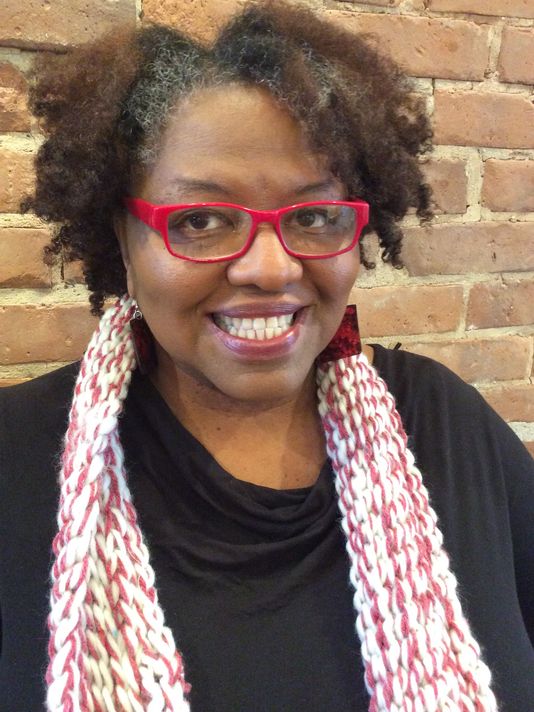
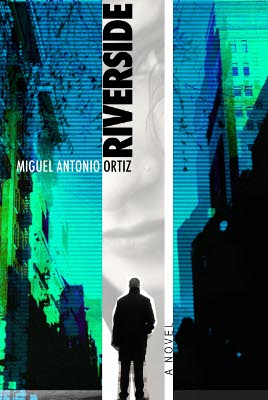
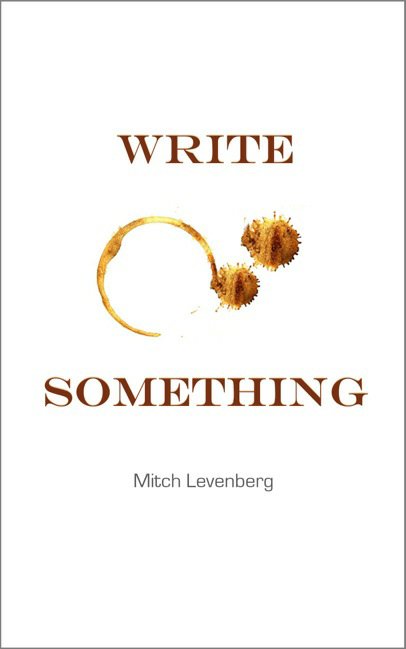
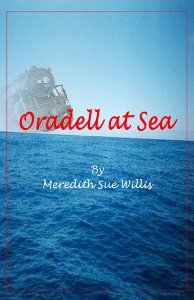


No comments:
Post a Comment